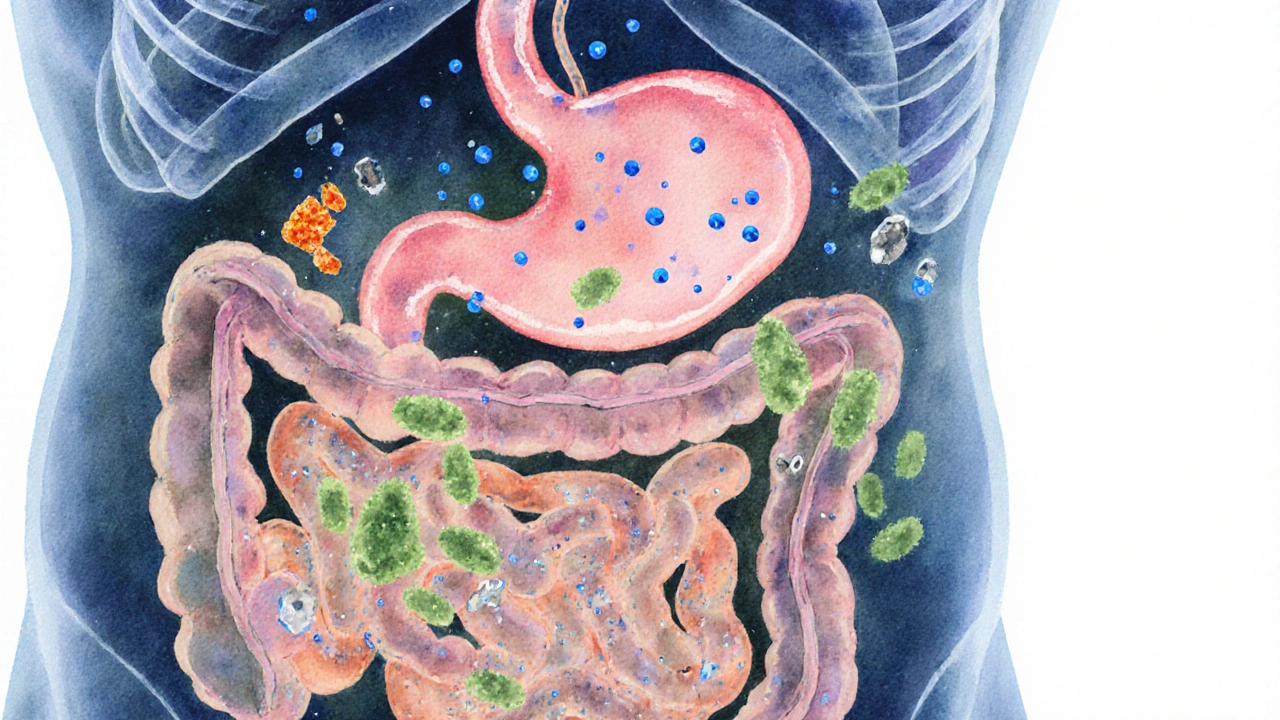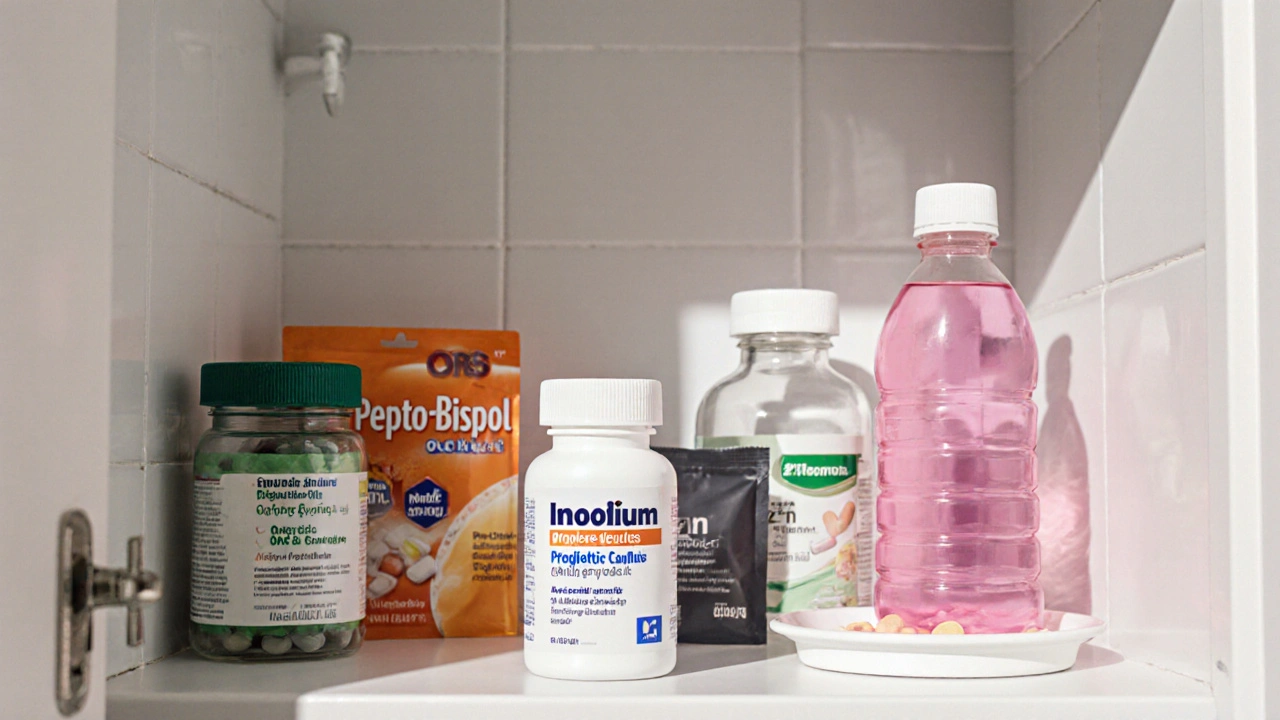When you’re suddenly stuck with loose stools, the urge to find a quick fix is real. Many people grab the familiar box of Imodium - the brand name for loperamide - because it promises to stop the ride fast. But Imodium isn’t the only option on the pharmacy shelf. Below we break down how Imodium stacks up against the most common alternatives, what each one does, and how to choose the right one for your situation.
Key Takeaways
- Imodium vs alternatives - Imodium works by slowing gut motility, while many other products focus on soothing the gut lining or replenishing fluids.
- Pepto‑Bismol (bismuth subsalicylate) can also treat nausea and indigestion, making it a broader‑spectrum choice.
- Lomotil (diphenoxylate/atropine) is prescription‑only and stronger, but carries a higher risk of side effects.
- Probiotics and oral rehydration solutions (ORS) don’t stop diarrhea directly but help the body recover faster.
- Safety matters: consider age, existing health conditions, and potential drug interactions before picking a product.
What Is Imodium (Loperamide)?
Imodium contains the active ingredient loperamide, a synthetic opioid that stays in the gut and does not cross the blood‑brain barrier in normal doses. By binding to μ‑opioid receptors in the intestinal wall, it reduces the frequency of muscle contractions, giving the colon more time to absorb water and electrolytes. The result is firmer stool and fewer trips to the bathroom.
Typical dosing starts with two 2mg capsules after the first loose bowel movement, followed by one capsule after each subsequent episode, not exceeding eight capsules (16mg) in 24hours. Effects usually kick in within an hour and last 4‑6hours.
How Do Common Alternatives Work?
Below is a quick snapshot of the main mechanisms behind the other products you’ll see on the counter.
- Pepto‑Bismol (bismuth subsalicylate) coats the stomach lining, reduces inflammation, and has mild antimicrobial properties. It also binds toxins produced by certain bacteria, which can be helpful in travel‑related diarrhea.
- Lomotil mixes diphenoxylate - a more potent opioid that slows gut motility - with atropine to discourage misuse. It’s prescription‑only because higher doses can cause central nervous system effects.
- Probiotic blends, often featuring Lactobacillus and Bifidobacterium, restore a healthy gut flora balance, which can shorten the duration of infectious diarrhea.
- Oral rehydration solution (ORS) supplies the exact ratio of glucose and electrolytes needed for optimal water absorption, preventing dehydration without affecting bowel movements.
- Zinc supplementation, especially in children, shortens the course of acute diarrhea by enhancing mucosal immunity.
- Activated charcoal adsorbs toxins and gases in the gut but does not influence motility; it’s best for gas‑related upset rather than true diarrhea.
Side‑by‑Side Comparison
| Product | Active Ingredient | Primary Action | Typical Use | Key Benefits | Common Side Effects |
|---|---|---|---|---|---|
| Imodium | Loperamide | Slows intestinal motility | Acute, non‑bloody diarrhea | Fast onset, easy dosing | Constipation, abdominal cramping |
| Pepto‑Bismol | Bismuth subsalicylate | Coats gut lining, reduces inflammation | Travelers’ diarrhea, upset stomach | Also relieves nausea, can be used by kids | Black tongue, temporary stool darkening |
| Lomotil | Diphenoxylate/Atropine | Strongly reduces motility, anti‑spasmodic | Severe or chronic diarrhea (prescription) | More potent than loperamide | Drowsiness, dry mouth, potential CNS effects |
| Probiotic blend | Lactobacillus+Bifidobacterium spp. | Restores healthy gut flora | Post‑antibiotic diarrhea, IBS‑related | Supports long‑term gut health | Mild gas or bloating |
| ORS | Glucose+Electrolytes (Na⁺, K⁺, Cl⁻) | Enhances water absorption | Any diarrheal episode, especially in children | Prevents dehydration, inexpensive | Rare: mild taste aversion |
| Zinc supplement | Zinc gluconate | Boosts mucosal immunity | Acute childhood diarrhea | Shortens illness duration | Metallic taste, nausea |

Pros and Cons of Each Option
Imodium shines when you need rapid symptom control without a prescription. It’s cheap, easy to store, and works for most short‑term cases. The downside is that it masks the symptom without addressing the underlying cause, which can be risky if you have an infection that needs to be expelled.
Pepto‑Bismol offers a broader range of relief (stomach upset, nausea) and even has mild antibacterial effects against Helicobacter pylori. However, it can turn stool black, which scares some users, and should be avoided by people allergic to aspirin.
Lomotil is the heavy hitter for severe diarrhea, especially when caused by inflammatory bowel disease or after surgery. Prescription status ensures a doctor evaluates safety, but that also makes it less accessible.
Probiotics are great for restoring a healthy microbiome after antibiotics or for mild, non‑infectious diarrhea. Their impact isn’t immediate, so they’re better suited for prevention and long‑term gut health.
ORS doesn’t stop the stools, but it prevents the dangerous fluid loss that can lead to hospitalization, especially in children and the elderly. It’s a must‑have for any travel kit.
Zinc is simple, cheap, and especially effective in low‑resource settings. It shouldn’t replace rehydration therapy but works well in combination.
Activated charcoal is limited to toxin adsorption; it won’t help with watery diarrhea caused by viral infection.
How to Choose the Right Product
Start with a quick self‑check:
- Is the diarrhea watery, non‑bloody, and lasting less than 48hours? If yes, Imodium or Pepto‑Bismol are reasonable first choices.
- Do you have fever, blood in stool, or severe abdominal pain? Those signs point to an infection that should be evaluated by a clinician; avoid antidiarrheals that could trap pathogens.
- Are you caring for a child under five or an elderly person? Prioritize ORS and zinc; antidiarrheals can be too strong for young kids.
- Are you on other medications (e.g., antibiotics, antidepressants) that interact with opioids? Loperamide can increase levels of certain drugs; check with a pharmacist.
- Do you need a broad‑spectrum remedy that also soothes nausea? Pepto‑Bismol covers both.
When in doubt, combine a low‑dose antidiarrheal (like one 2mg capsule of Imodium) with ORS to manage fluid loss while you monitor symptoms.
Safety Considerations and Common Pitfalls
Even over‑the‑counter drugs can cause problems. Here are the most frequent mistakes:
- Exceeding the maximum daily dose of loperamide - high doses can lead to serious cardiac arrhythmias.
- Using antidiarrheals for infectious diarrhea caused by Clostridioides difficile. Slowing gut movement can worsen toxin buildup.
- Giving Pepto‑Bismol to children who take salicylate‑containing medications (e.g., aspirin) - risk of Reye’s syndrome.
- Ignoring dehydration signs: dry mouth, dizziness, reduced urine output. If any appear, switch focus to ORS immediately.
- Assuming probiotics work instantly - they need at least 24‑48hours to colonize.
If you notice persistent cramps, vomiting, or high fever, stop the self‑care regimen and seek medical advice.

Quick Reference Checklist
- Identify the cause: viral, bacterial, food‑related, medication‑induced.
- Assess severity: mild (≤2‑3 loose stools/day) vs. severe (≥5 stools/day, blood, fever).
- Pick the tool: Imodium for fast symptom control; Pepto‑Bismol for combined nausea; ORS/Zinc for hydration; probiotics for gut recovery.
- Watch dosage limits and drug interactions.
- Switch to medical care if symptoms persist >48hours or worsen.
Frequently Asked Questions
Can I take Imodium while I have a stomach bug?
If the bug is viral and you’re not vomiting or feverish, a single low dose of Imodium can help you feel better while your body clears the virus. However, if you have a high fever, bloody stools, or severe cramps, skip the antidiarrheal and focus on hydration.
Is Pepto‑Bismol safe for pregnant women?
Pepto‑Bismol contains a small amount of salicylate, which is similar to aspirin. Most doctors advise pregnant women to avoid it, especially in the first trimester, and to use safer alternatives like ORS and a low dose of Imodium if needed.
How long should I keep taking a probiotic after a bout of diarrhea?
A 7‑ to 14‑day course is typical. Continue the probiotic for at least a week after symptoms stop to help restore the gut balance fully.
Can I give my 2‑year‑old child ORS and zinc without a doctor?
Yes. WHO‑recommended ORS packets and a daily zinc supplement (10‑20mg) are safe for toddlers and are the first line of treatment for mild to moderate dehydration.
What should I do if I accidentally take too much Imodium?
Stop taking more, drink plenty of fluids, and seek emergency care if you notice heart palpitations, severe constipation, or dizziness. High doses can affect heart rhythm.
Next Steps
If you’re stocked with a box of Imodium, consider adding a small packet of ORS and a probiotic supplement to your medicine cabinet. For travelers, Pepto‑Bismol offers extra comfort against nausea. And if you ever feel unsure about the cause of your diarrhea, a quick chat with a pharmacist can prevent unnecessary medication and point you toward the safest choice.

